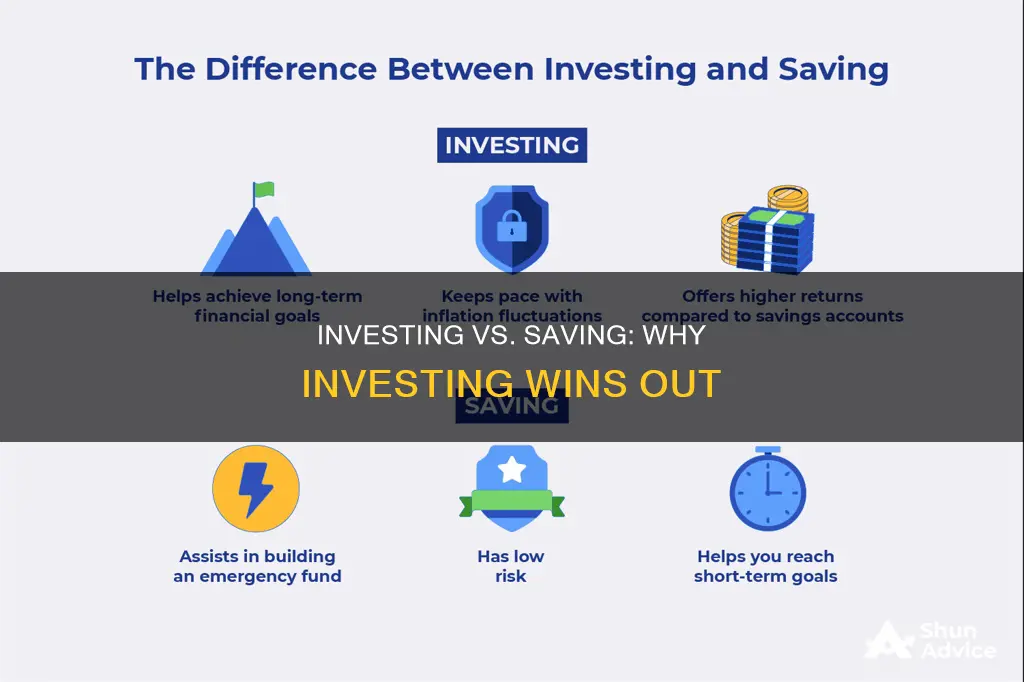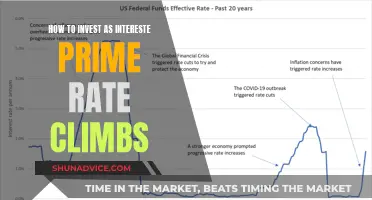
Saving is for preserving your money, while investing is for growing it. If you have built up your emergency fund and don't carry any high-interest debt, investing your extra money can help you grow your wealth over time. However, it's important to note that saving is the first step to investing, as it ensures you have the financial security to take on the risk of putting your money in the market.
| Characteristics | Values |
|---|---|
| Savings are for | Preserving your money |
| Investments are for | Growing your money |
| Savings | Earn a steady amount of interest |
| Investments | Returns can fluctuate |
| Savings | Can be withdrawn virtually anytime |
| Investments | May have barriers to access |
| Savings | Best for immediate or near-term expenses |
| Investments | Best for long-term goals like retirement |
| Savings | Should be prioritised over investments if you have high-interest debt |
What You'll Learn

Investing is better for long-term goals
Investing is crucial if you're going to achieve long-term goals like retirement. For instance, paying your child's college tuition in a few months should be in savings, but if you have a year or more, then investing in the stock market may be a better option.
Saving is the first step to investing because, without it, you're not ready to take on the risk of putting your money in the market. It can take time to build up savings for dedicated expenses, but doing so means you avoid taking on high-interest debt because there's a guaranteed pot of cash to pull from. You know exactly what your return will be, but you will lose purchasing power due to inflation.
Investment Loan Interest: Higher or Lower?
You may want to see also

Savings are better for immediate expenses
Financial adviser and wealth manager Laurie Itkin says:
> When you save your money, you know exactly what your return will be. While you will lose purchasing power due to inflation, you know your return won’t be lower than that.
It's also better to keep an emergency fund in a more stable and liquid account, like a savings account, to ensure immediate accessibility without risking capital loss. If you have debt and want to start saving and investing, it's recommended that you prioritise paying off high-interest debts first, as these can grow faster than potential earnings from investments.
Once high-interest debts are managed, you can increase your savings and invest more significantly, focusing on long-term financial goals.
Compounding Interest: Annual vs. Quarterly, Which is Better?
You may want to see also

Savings are better for emergencies
It's also important to prioritise paying off high-interest debt before investing. This is because high-interest debt can grow faster than potential earnings from investments. Once high-interest debts are managed, you can increase your savings and invest more significantly, focusing on long-term financial goals.
Saving is ultimately the first step to investing because, without it, you're not ready to take on the risk of putting your money in the market. When you save money in a bank account, you earn a steady amount of interest and keep your principal intact. When you invest in the stock market, your returns can fluctuate from day to day.
Strategies for Locating Initial Compound Interest Investments
You may want to see also

Investing is better for growing your wealth
Investing is crucial if you’re going to achieve long-term goals like retirement. For example, if you want to pay your child’s college tuition in a few months, you should put that money in savings. However, if you have a year until you need to buy a house, you might consider investing in the stock market.
It’s important to have an emergency fund in a stable and liquid account, like a savings account, to ensure immediate accessibility without risking capital loss. If you have debt and want to start saving and investing, prioritise paying off high-interest debts first, as these can grow faster than potential earnings from investments. Once high-interest debts are managed, you can increase your savings and invest more significantly, focusing on long-term financial goals.
Saving is ultimately the first step to investing because, without it, you're not ready to take on the risk of putting your money in the market. To make sure you are earning the greatest return on your savings, especially when you are relying on it as an emergency fund, use a high-yield savings account.
Understanding the Magic of Compounding Interest in Investments
You may want to see also

Savings are better for preserving your wealth
You can also use savings to build an emergency fund. It's better to keep this in a more stable and liquid account, like a savings account, to ensure immediate accessibility without risking capital loss. If you have debt and want to start saving and investing, it's a good idea to prioritise paying off high-interest debts first, as these can grow faster than potential earnings from investments.
Once high-interest debts are managed, you can increase your savings and invest more significantly, focusing on long-term financial goals. It's worth noting that saving is ultimately the first step to investing because, without it, you're not ready to take on the risk of putting your money in the market.
To make sure you are earning the greatest return on your savings, especially when you are relying on it as an emergency fund, use a high-yield savings account. Just make sure the one you choose has no monthly fees, low (or no) minimum balance requirements and an interest rate (referred to as "annual percentage yield," or APY) that's higher than a normal savings or checking account.
Invest Wisely: Utilize UK Compound Interest
You may want to see also
Frequently asked questions
Saving is for preserving your money, while investing is for growing it. When you save money in a bank account, you earn a steady amount of interest and keep your principal intact. When you invest in the stock market, your returns can fluctuate from day to day.
Investing is crucial if you’re going to achieve long-term goals like retirement. If you have built up your emergency fund and don’t carry any high-interest debt, investing your extra money can help you grow your wealth over time.
Saving money is best when you have immediate or near-term expenses that your monthly income wouldn’t cover on top of your usual spending. It can take time to build up savings for dedicated expenses, but doing so means you avoid taking on high-interest debt because there’s a guaranteed pot of cash to pull from.
Saving is the first step to investing because, without it, you're not ready to take on the risk of putting your money in the market. It is recommended to build an emergency fund in a more stable and liquid account, like a savings account, to ensure immediate accessibility without risking capital loss.







